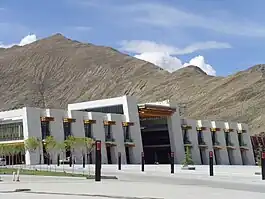| Lhasa–Xigazê railway | |
|---|---|
 The line's eastern terminus at Lhasa railway station | |
| Overview | |
| Locale | Tibet Autonomous Region, China |
| Termini | |
| Service | |
| Type | Heavy rail |
| History | |
| Opened | 16 August 2014 |
| Technical | |
| Line length | 253 km (157 mi) |
| Number of tracks | 2 |
| Track gauge | 1,435 mm (4 ft 8+1⁄2 in) standard gauge |
| Operating speed | 120 km/h (75 mph) |
The Lhasa–Xigazê railway, or La'ri railway (simplified Chinese: 拉日铁路; traditional Chinese: 拉日鐵路; pinyin: Lārì Tiělù; Standard Tibetan: lha gzhis lcags lam ལྷ་གཞིས་ལྕགས་ལམ་), is a high-elevation railway that connects Lhasa to Xigazê, in the Tibet Autonomous Region.[1] The travel time between Lhasa and Xigazê on this line is roughly three hours.
History

The line was a spur line of the Qinghai–Tibet railway. The length of the railway is 253 km (157 mi).[2] Construction began in September 2010 and was connected to the Qinghai–Tibet Railway in May 2013. The line was completed in July 2014 and opened for commercial operations on August 16, 2014. Soon after opening, the line became the primary mode of transport between Lhasa and Xigazê; the two destinations were previously only connected by road and air, and air travel was too expensive at the time for the large majority of local residents.[3]
The exiled Central Tibetan Administration in Dharamsala has claimed that the rail line will dilute the cultural identity of Tibetans by accelerating the movement of Han migrants into Tibet.[4]
Stations
The line includes 14 stations, of which only a few see regular passenger traffic (Qüxü, Rinbung). The project had a budget of 10.8 billion yuan.[5]
The completion of this project opened up possible extensions of the network further west and south into Nepal and to Yadong County, close to the border with Sikkim, India.[6]
- Lhasa railway station (拉萨)
- Lhasa South railway station (拉萨南)
- Baide railway station (白德)
- Xierong railway station (协荣)
- Qüxü County railway station (曲水县)
- Chabala railway station (茶巴拉)
- Nyêmo railway station (尼木)
- Karu railway station (卡如)
- Rinbung railway station (仁布)
- Dazhuka railway station (大竹卡)
- Denggu railway station (灯古)
- Jiqiong railway station (吉琼)
- Kadui railway station (卡堆)
- Xigazê railway station (日喀则)
Extension
Although there were plans to extend the line with another 700 km (435 mi) to the Chinese border with Nepal, those plans became delayed due to difficulties on the Nepal side after the April 2015 Nepal earthquake. Feasibility studies were proposed for extension towards Zhangmu, although another border crossing may be chosen due to major Nepali abandonment of the border post.[7] However it has also been reported that the line will be extended to Gyirong County regardless of the progress on the China-Nepal railway.[8]
See also
References
- ↑ "视频:青藏铁路延伸线拉日铁路今日开工". CCTV. Retrieved 24 September 2012.
- ↑ "China to wrap up Tibet railway extension line - Xinhua | English.news.cn". news.xinhuanet.com. Archived from the original on 2013-03-13.
- ↑ "Tibet railway opens to Xigaze". Railway Gazette. August 15, 2014. Retrieved August 16, 2014.
- ↑ "Lhasa-Shigatse rail line threatens cultural identity of Tibet". news.biharprabha.com. IANS. 25 July 2014. Retrieved 27 July 2014.
- ↑ F_493. "Lhasa-Shigatse railway to complete track-laying - People's Daily Online". chinatibet.people.com.cn. Retrieved 20 April 2018.
{{cite web}}: CS1 maint: numeric names: authors list (link) - ↑ Extension plans. Retrieved June 28, 2006
- ↑ "中国尼泊尔研跨境铁路 探索构建中尼印经济走廊". news.sina.com.cn. Retrieved 20 April 2018.
- ↑ Sangraula, Bikash (2019-10-11). "To decrease its dependence on India, Nepal eagerly awaits China rail plan". The Japan Times. Retrieved 2021-10-19.